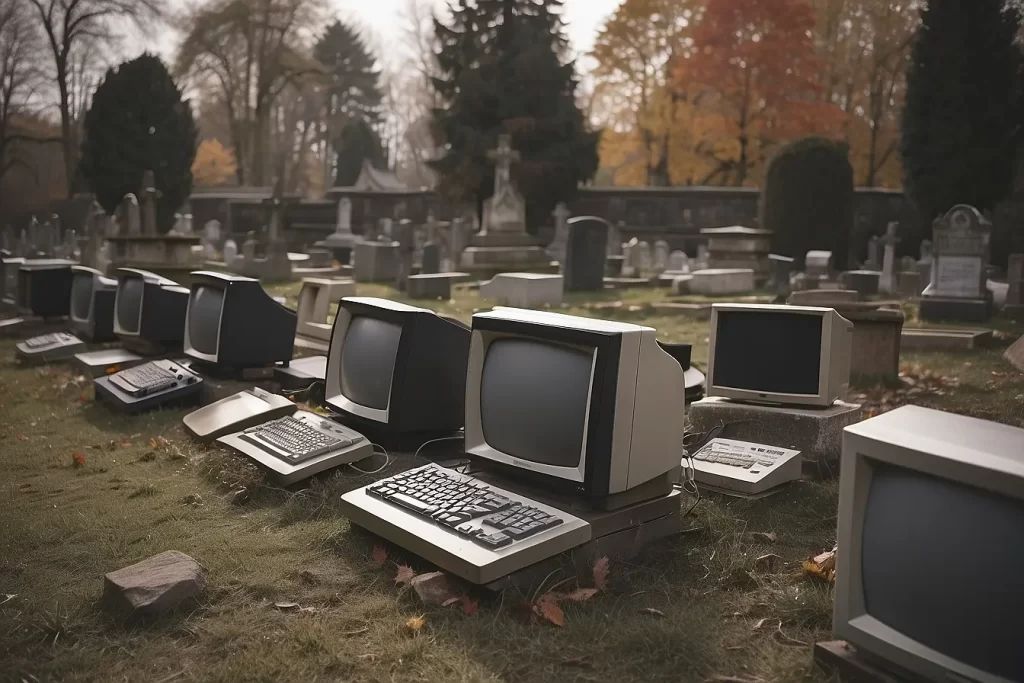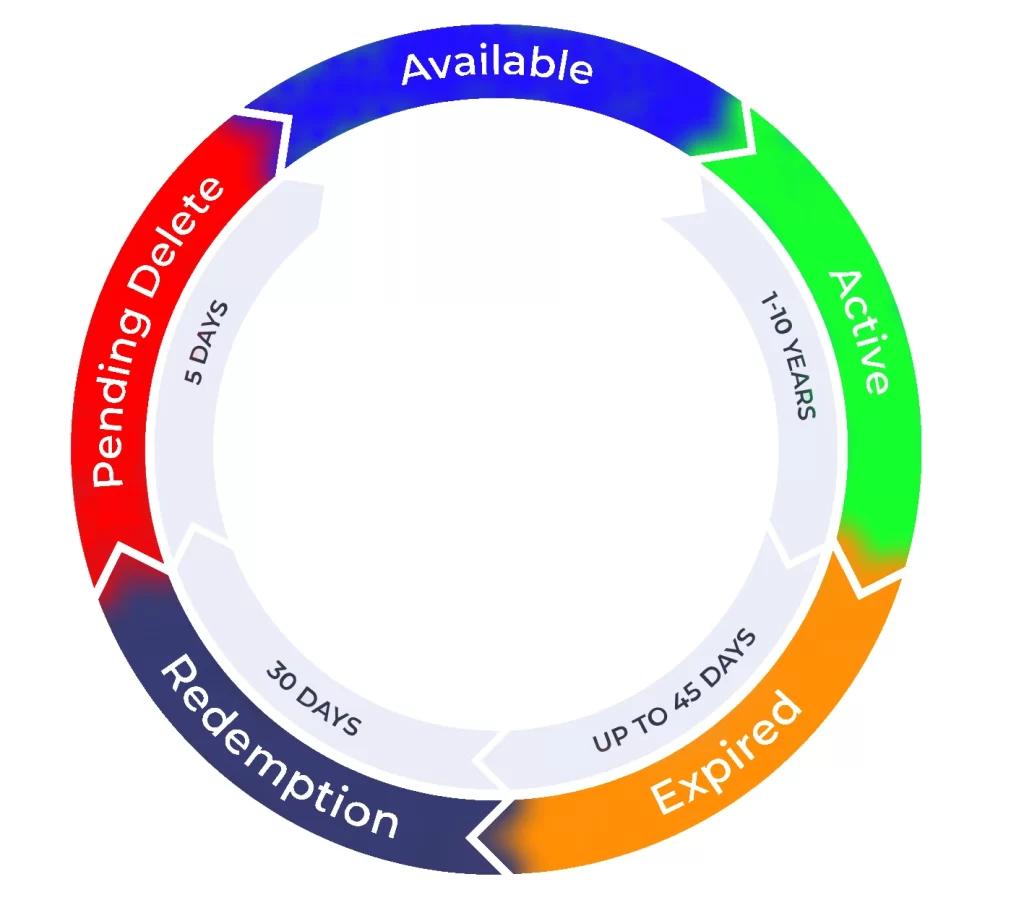What Happens When a Domain Expires?
13-01-2024 - BlogsWhat Happens When a Domain Expires?
Understanding what happens when a domain expires is crucial for anyone involved in the digital landscape, whether you’re a business owner, a blogger, or an investor. When a domain name expires, it doesn’t immediately become available for others to register. Instead, it enters a grace period that can last from a few days to several weeks, depending on the registrar’s policies.
During this period, the original owner can still renew the domain, often at the standard renewal price. If the owner does not renew during this phase, what happens to a domain name when it expires is it will then move into a redemption phase. In this redemption phase, the owner can still reclaim the domain, but at a higher fee. This additional cost acts as a deterrent against letting valuable domains lapse unintentionally.
If the domain remains unclaimed post-redemption, what happens next is that it enters into a deletion phase, where it’s released and made available for the public to register. At this stage, what happens to a website when the domain name expires is that the website becomes inaccessible, and any services associated with the domain, such as email, will cease to function.
Domain expiration can hence disrupt online presence and access. This is a critical consideration for those reliant on the internet for business or personal branding, emphasizing the importance of managing domain registrations proactively.
Understanding The Basics, Domain Expiration
When delving into the realm of website administration and digital property, grasping the concept of domain expiration is fundamental. Have you ever pondered what happens when a domain expires? Or perhaps what ensues specifically when a domain name reaches the end of its registration period? It’s crucial to not only focus on the creation and maintenance of a web presence but also to understand the implications linked to the life cycle of a domain name.
The expiration of a domain name is not an instantaneous event but a process. When a domain name expires, it sets off a chain reaction that can affect the visibility and accessibility of the associated website. Understanding what happens to a domain name when it expires, and, by extension, the consequences for the website is vital for any individual or business relying on the internet for their operations.

The Domain Expiration Timeline
Understanding the domain expiration timeline is critical for managing an online presence effectively. What happens when a domain name expires isn’t an abrupt cessation but a phased process, with each stage having specific outcomes and opportunities for action. Starting from the moment what happens to a domain name when it expires, this timeline encapsulates the sequence of events that unfold as the domain transitions from active to potentially available status.
When exploring what happens to a domain name when it reaches its expiration date, it is important to acknowledge the systematic progression that follows. These include notification periods, grace periods, and eventual release to the public if not renewed. The website associated with the expired domain also experiences changes, and it’s essential for owners to understand what happens to a website when the domain name expires. This knowledge includes when the site might go offline and what steps one can take to reclaim or extend the domain’s registration.
In this section, we will delineate the domain expiration timeline, outlining key phases and the corresponding outcomes that affect a website’s continuity and ownership continuity. Being well-versed in this timeline equips domain owners with the necessary foresight to make informed decisions regarding their domain assets, and manage their digital properties with precision.

The ‘Avalible’ period
The domain name is available for anybody to purchase, at any registrar that supports the TLD
The ‘Active’ period
After completing the registration process, a domain status changes to Active. This means it is now operational as a web address, and whoever purchased it have full autonomy to alter its configurations and update its DNS records.
The ‘Expired’ period
Neglecting to renew a domain before its expiration date leads to this phase, and eventually its deletion after around 45 days. A placeholder, or ‘parked’, page will signal the domain’s expired status to visitors – when a domain is expired. Additionally, a expired domain cannot be transferred to a different registrar until it has been renewed.
The ‘Redemption’ period
Upon reaching the end of its expiration period, a domain enters the redemption phase, typically spanning 30 days for most common top-level domains such as .com and .ca. During this time, your website, email, and any services tied to the domain will be inoperative, and the domain’s information is queued for removal from the registry.
The ‘Pending Delete’ period
Should the domain remain unrenewed after the redemption period concludes, it transitions into the pending delete phase. At this juncture, redemption or modification of the domain is no longer an option. This phase persists for a brief window of five days, concluding with the domain’s deletion and subsequent availability to the general public for new registration. Specifically for .CA domains, they become accessible for new registration on the Wednesday immediately after the redemption period ends.
Once a domain re-enters the market, regaining control over it can be quite difficult. The domain may be caught up in an auction, placed on backorder, or even acquired by a new party, often resulting in a significant expense to repurchase it.
Could Your Expired Domain Be Snatched Up?
When exploring the intricacies of domain expiration, a question of substantial concern is whether your expired domain could be snatched up by another party. Once you understand what happens when a domain expires, it’s equally important to consider the potential aftermath: the prospect of your domain being registered by someone else. It’s not just a matter of grasping what happens when a domain name expires. As a domain enters the expiration phase, several factors come into play that might lead to it being acquired by a new owner.
Knowing what happens to a website when the domain name expires is a critical aspect of this concern. Typically, once the domain passes through the expiration process, including the grace period and redemption phases, it becomes available on the open market. This availability ushers in opportunities for domain buyers to claim ownership, especially if the domain has established traffic or branding value.
How to Avoid your Domain from Expiring
Ensuring the continued security of your domain name should be a priority for any website owner – proactive measures can prevent the inadvertent loss of a domain due to expiration. By adopting some of these practices, you can significantly reduce the risk of domain expiration and the subsequent complications it may cause. Keep in mind that maintaining control of your domain name is vital to your brand’s online presence and credibility. Here are several best practices to help safeguard your domain
Set up auto-renewal
Enabling auto-renewal through your domain registrar means your domain will automatically be renewed before it expires, thus eliminating the risk of forgetting to renew manually.
Keep your contact information updated
Registrars will send renewal notices via the contact details on file. Keeping this information accurate ensures that you receive timely reminders about your domain’s renewal status.
Use calendar reminders
In addition to relying on your registrar’s notifications, set calendar alerts for renewal dates well in advance, enabling ample time to address any potential issues.
Monitor expiration dates
Regular checks on your domain’s expiration status can keep you apprised of when action is needed.
Secure your registrar account
Use strong passwords and two-factor authentication to prevent unauthorized access and changes to your domain settings.
What Happens to your Domain after its Deleted/Expired?
The deletion of a domain ushers it into a new existence outside your control. Once a domain is officially deleted from the registrar database, it no longer belongs to the former owner and all associated services cease to function. However, your old domain doesn’t just fade into obscurity; it often ends up on expired domain lists, watched eagerly by domain traders and entrepreneurs – these lists are hotspots for those seeking to take advantage of the existing traffic or SEO value that comes from older domains.
For your domain, this could mean a new life under a new owner who can harness its latent potential – it’s a stark reminder to manage your domain actively lest you want it to find a new purpose without you.
